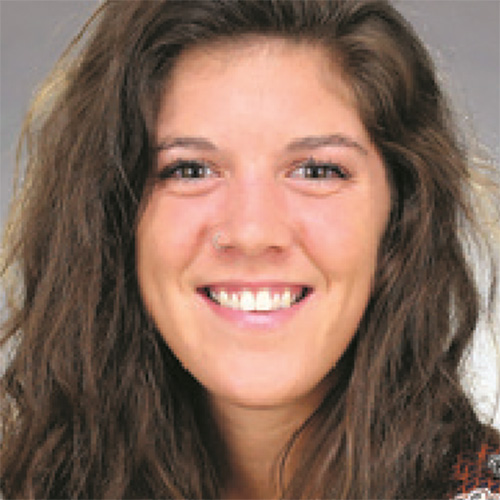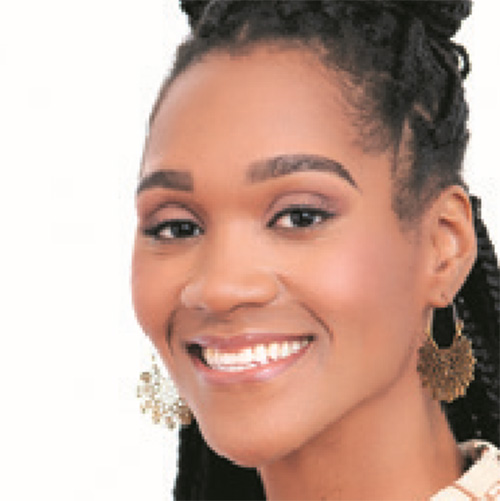
Kaleigh Badecki
Assistant women’s basketball coach and assistant strength coach
During my eight years at Gettysburg College, I’ve had the pleasure of coaching some incredible female student-athletes. I believe that athletes are problem-solvers, overcoming challenges that may arise. Winning and success have no loyalty. Thus, grit is built and, even more so, required from student-athletes to be successful on and off the field.
Grit is determination. It requires a growth mindset that gives student-athletes the ability to find solutions and not be held captive to circumstances. It’s also the attitude to focus on the controllable. Some student-athletes are gifted with ability, and others work for every ounce of talent they have. Grit requires perseverance and focus on the process instead of immediate outcomes.
I love seeing our players truly challenge themselves for maybe the first time ever in their lives. It’s my joy to help them find that grit to stay dedicated throughout their journey and fight a culture that says, “If it’s not quick and easy, it’s not worth it.” It is worth it. Success is found when student-athletes discover what they are truly capable of.

Lawrese Brown ’10
Entrepreneur
Most people hear the word grit and believe they don’t have it because they haven’t overcome an extraordinary challenge. But grit is more simple—grit is a willingness to adjust.
Take it from a business owner who is incredibly stubborn. My stubbornness enabled me to be among the 12% of women who crossed six figures in revenue. I stayed the course for eight years, endured rejections, and niched my services to focus on communication training—and it paid off. It’s my willingness to change that’s enabled me to transition to new services in an economy where training, learning, and development is experiencing a downturn.
Grit requires action. When I navigate change, I ask myself: Am I willing to have challenging conversations? Do I have the courage to let go? Am I willing to venture into new endeavors? Do I have the courage to continue without support? Am I willing to raise my hand and ask for opportunities I want? Do I have the courage to be visible, despite previous failures?
These questions have allowed me to change and remain gritty, and I believe they will help others, too.

Dave Powell P’23
Professor of public policy
“Grit” became a popular buzzword in education a few years ago because it called up images of persistence, perseverance, and determination in the face of difficult challenges. In the right context, those traits are definitely good ones to have, but persistence and perseverance can look more like obedience and compliance under the wrong circumstances.
When education is considered narrowly as a personal experience, not a social one, characteristics like perseverance get valued over traits like empathy, creativity, compassion, and risk-taking. People with “grit” may know they have a job to do, but may not know why they’re doing it.
In classroom settings, I like it when students ask a lot of questions, change their minds when uninformed beliefs are challenged, and try to come up with novel solutions to thorny problems. No doubt, it takes some grit to do all those things—but it also takes humility, self-doubt, and good judgment to know when to give up on one idea and move on to the next one.
A little grit is a good thing, but it’s best to think of it as one attribute in the endless constellation of human traits that define who we are.

Jeffrey Rioux
Director of the Center for Public Service
We do not live in a meritocracy. There is a dominant narrative that says success is available to anyone who works hard. That is a flattering story to anyone who has achieved success but ignores factors such as wealth and luck. It is a demeaning story to those who work hard but lack equal opportunity, access to resources, and a network to connect them to a job, and, therefore, do not achieve success.
At the Center for Public Service, we know students and community members who have plenty of grit but still find themselves struggling against oppressive systems, such as unequal educational opportunities and false narratives, like drawing a connection between income and effort. I have no interest in responding to their struggle with adages about bootstraps or grit.
I like the idea of students and members of my community persevering in the face of obstacles. The fear is that if we emphasize the grit narrative too much, those who are unable to overcome those obstacles will be blamed for not having enough grit.

Christina Wade ’25
Health sciences major, biology and chemistry double minor
When I arrived at Gettysburg College, I was overwhelmed by all the available student resources. However, I quickly discovered a community where I found my place through co-curricular activities. Working as a leadership mentor for the Garthwait Leadership Center and a residence coordinator in the Office of Residential Education—coupled with the ambition instilled in me from my mother—has prepared me to take on challenges. These experiences have given me the resilience and grit necessary for my future career plans as a physician.
In addition to the knowledge gained through my major in health sciences and minors in biology and chemistry, I have learned how to bounce back from obstacles in times of stress. I am embarking on a long journey through medical school, but I know that my continuous involvement outside the classroom has given me the skills to achieve my dreams. I owe my success to Gettysburg’s focus on co-curricular activities and opportunities for student leadership. Thanks to these experiences, I have built the grit to reach my goals.